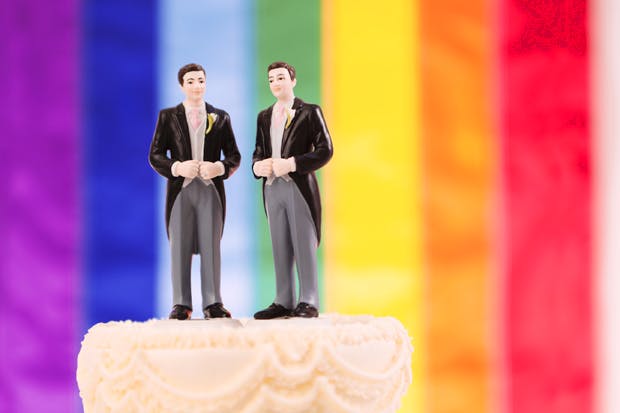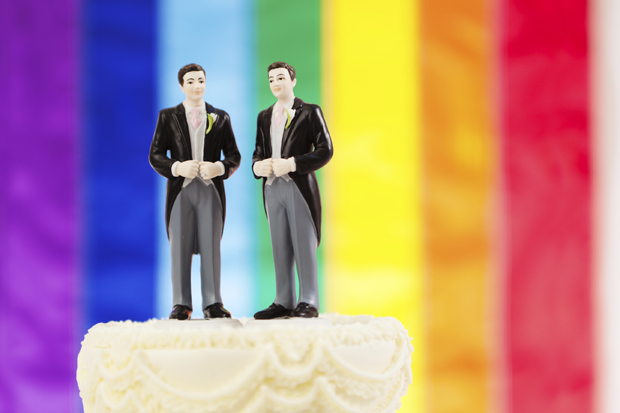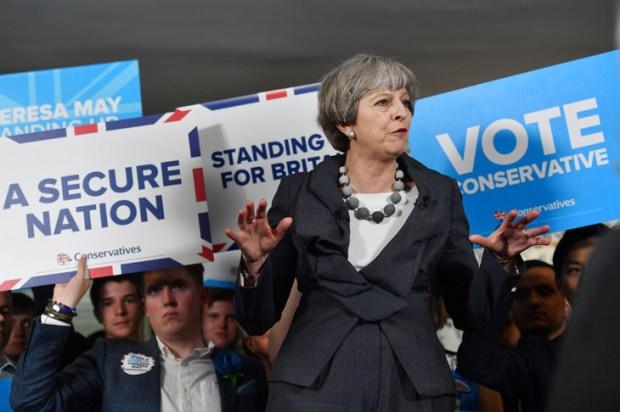Let us consider the case of the Ashers family bakery in Belfast which, in 2014, refused to make a cake. Or as some would have it, a ‘gay cake’, although that’s obviously ridiculous because all cakes are quite gay. This one, though, was requested by Gareth Lee, a local gay rights activist, who wanted it to have a picture of Bert and Ernie from Sesame Street on it, under the slogan ‘SUPPORT GAY MARRIAGE’, as the centrepiece of an event organised to do just that. On the basis that they were devout Christians, however, the family running this family bakery refused. And so, sore affronted, Lee sued. Really, if anybody ought to be suing here it’s Bert and Ernie, who are simply two grown puppets who share a house and should be free to define themselves however they please. They’re in America, though, so maybe they didn’t hear about it.
Last year, a court decided that the McArthurs, who run Ashers, had, indeed, discriminated against Lee by refusing the cake. This week, the Court of Appeal finally decided that, yes indeed, discrimination occurred. All in all, a hell of a fuss about a cake. Or more accurately, about no cake.
Melanie McDonagh and Peter Tatchell discuss the ‘gay cake’ ruling
It goes all over the place, this. Every theme, every line of thought twists back on to itself. If there is a free speech angle, for example (and I’m pretty sure there is), in which direction does it go? Was Lee being denied free speech because they wouldn’t make his cake? Or were the McArthurs being denied free speech because they were having to write words they didn’t want to? Some have suggested it has been a case about gay rights, although it might not have been, because the McArthurs would presumably have refused to make the same cake for a straight person, too. Others have suggested it was about religious rights, although that doesn’t sound quite right, either, because if a religious person has the right not to bake a cake then presumably so does anybody. Also, I’m pretty sure ‘Thou shalt not make a Bert and Ernie equal marriage cake’ is not one of the Ten Commandments, anyway.
Obviously, the fact that the last paragraph included the phrase ‘the right not to bake a cake’ in a serious news publication, in cold blood, is worthy of concern in itself. Yet this, fundamentally, is what this case comes down to. Is there such a thing as the right not to bake a cake? And crucially, is it a greater or lesser right than the right to buy a cake? When one individual baker boycotts gay cake sloganeering, it may seem heavy–handed to prosecute. What, though, if all bakers did? What if no baker in the land was prepared to write ‘SUPPORT GAY MARRIAGE’ on a cake? Or, to turn it around, what if it was Christians who found themselves turned away from bakeries? What if, say, all bakers everywhere were gay atheists and, when asked for hot cross buns at Easter, replied, ‘Sorry, no, we shan’t do crosses, you may only have these buns here, on each of which, my God-fearing friend, we have drawn a willy’? What of your freedom then?
I am not the only person to have been confused. Peter Tatchell, whose convictions are firm, awe-inspiring and increasingly unpredictable, started out condemning the Ashers and then ended up supporting them, although also damning them, like a man who has walked into a hall of mirrors and walked out again with a bloody nose after crashing into the back of his own head. The ruling against Ashers, he wrote this week, ‘implies that gay bakers could be forced by law to decorate cakes with homophobic slogans’. Although I’m not sure that’s quite right, because ‘Support gay marriage’ isn’t really the equivalent of a homophobic slogan for Christians, any more than ‘Support West Ham’ would be for somebody who supports Aston Villa. Although, that being said, you wouldn’t expect a Villa fan baker to end up in court for refusing to make a West Ham cake, would you? Or at least last week you wouldn’t have. Maybe after this you would.
Personally, I’m of the view that you don’t have to agree with everything you write on a cake. If the McArthurs had taken themselves a little less seriously, none of this would have happened. Even more so, though, the same is clearly true of Lee. When we read these days of Generation Snowflake, unable to stomach the views of others, we expect to learn of students, bickering over gender identity. It turns out that Christian bakers and middle-aged activists behave no better. Agree to disagree, the lot of you. Be nicer. Or if you can’t, just shut your cakeholes. Once this sort of nonsense gets to court, all the outcomes are bad.
Brexit ruins my case for the Union
I can feel my views on Scottish independence changing. Not enough to write a column about it, perhaps, but enough to sneak in a mention down here. Scotland voted to stay in the EU, and England didn’t, and this somehow changes everything. People who argue that Scotland also voted to stay in the UK, and so should lump it, miss that point, probably on purpose. Every aspect of Scotland’s settlement with the wider UK, from devolution to the Barnett formula, accepts that the effect of straightforward majority UK rule needs to be mitigated for the Union to survive. Brexit is a deviation from this.
Independence still seems like a bad idea. Economically, I’m pretty sure, it would be an even madder act of folly than it would have been last time. Still, the unionist case I made last time, and believed in, was emotional and cultural more than it was financial, and I’m honestly not sure I could make it again. ‘Bought and sold for English gold,’ sneered the Nats back in 2014. Next time, they’ll be right.
Got something to add? Join the discussion and comment below.
Get 10 issues for just $10
Subscribe to The Spectator Australia today for the next 10 magazine issues, plus full online access, for just $10.















Comments
Don't miss out
Join the conversation with other Spectator Australia readers. Subscribe to leave a comment.
SUBSCRIBEAlready a subscriber? Log in